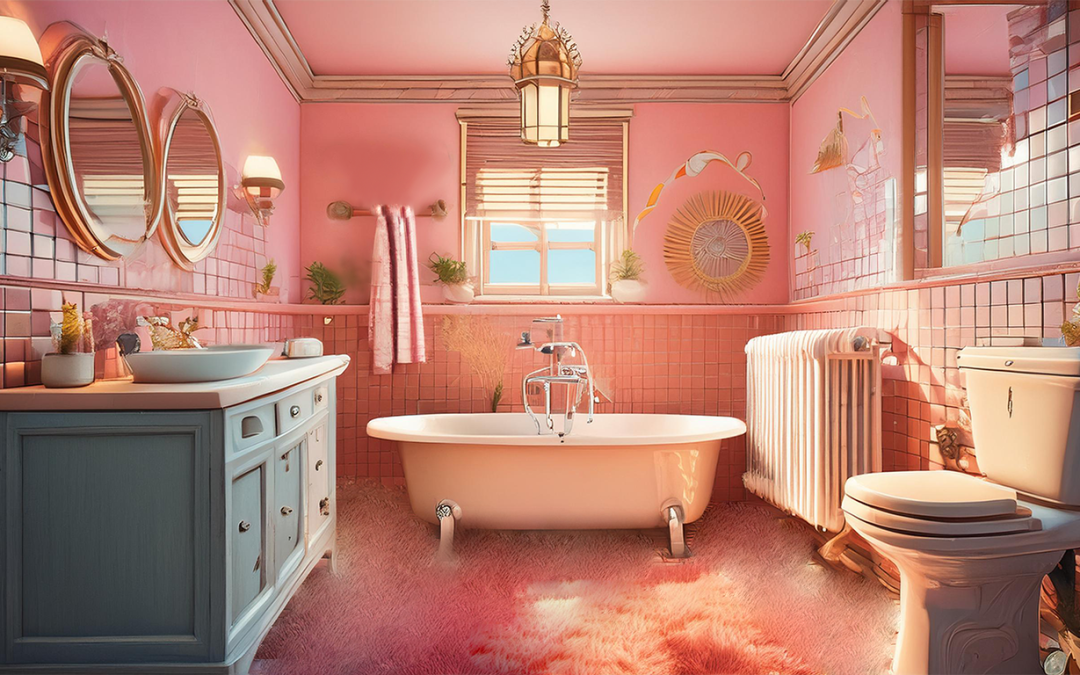Photo by Adobe Firefly
June 2024
Everything Old
If you sprinkle when you tinkle…
by Corbin Crable
This month’s cover story relays the history of outhouses, those quiet but stinky outdoor private places where everyone did their business in the 19th century.
First, however, I’d like to fast-forward through time to the mid-20th century, a time when tackiness could be found in every room of one’s house, from aspic in the refrigerator to shag carpet in the living room. The bathroom wasn’t spared from trends on which we now can look back and laugh, either. Conversely, some of the bathroom trends with which you grew up are ones you may remember fondly.
Good or bad, here are a few trends you might recall:
Carpet: Like nearly everything made since the Industrial Revolution, as the volume of carpet produced rose, its price soon saw a dip. In the postwar era, carpet production boomed, and American families in the suburbs snatched it up as it became more affordable. Despite its new affordability, however, carpets seemed to convey luxury and comfort.
Sometime during the 1960s, wall-to-wall carpeting in one’s bathroom became a desirable option – heightened risk of mold growth be damned. By the 1970s, shag carpeting had made its way onto toilet lids and even toilet seats as well (I shudder with revulsion at the thought, don’t you?). The garish trend finally died out during the 1980s. And speaking of which:
Padded toilet seats:
Most sources seem to agree that David Harrison invented these in 1993, though I’ve always thought they were older. Maybe that’s because my grandparents had them in every bathroom of their house. I can still hear the pppfffttttt sound the seats made when I sat on them.
Colored toilet paper: Who wants to wipe their tuchus with boring white toilet paper when mint green toilet paper exists? It was one of a rainbow of pastel colors in which toilet paper was made. The 20-year period between the 1950s and the 1970s saw the use of toilet paper in colors such as pink, blue, green, brown, and another shade of brown. In the ‘70s, however, doctors warned of the dangers of the dyes found in these colorful rolls, and the paper was summarily flushed away, lost to time.
Toilet paper cozies:
You had to cover your toilet paper in something, and these items conveniently combined your love of the crochet arts with the practicality of paper designed to keep your derriere clean. The most collectible variation on the toilet paper cozy came in doll form, made to look like a dainty Southern belle wearing a huge gown from the Antebellum South. Was the addition of a dainty cover meant to “soften” a taboo topic such as using the potty? Between these ladies and the lack of any bathroom in the “Brady Bunch” house, I’d like to think so. They physically concealed toilet paper but metaphorically concealed acknowledgment of its existence. Or perhaps I’m overthinking such a simple creation.
Colorful tile on all
surfaces: Bathrooms done in pastel-colored tiles were all the rage from the 1930s to the ‘50s. Want your bathroom to be Pepto Bismol pink, just like First Lady Mamie Eisenhower? You got it. Surely it’s a decision you won’t later regret.
Now, if you’re reading this on the toilet, I hope this little distraction has made your time on the john go a bit faster. We’ll see you the next time nature calls.


